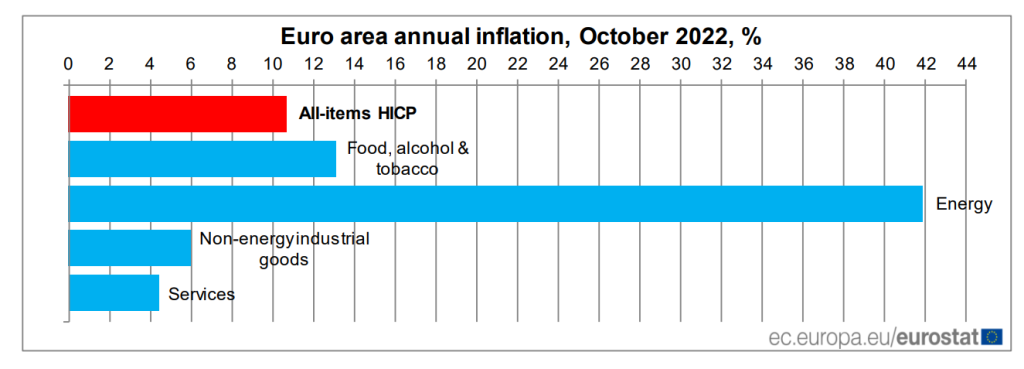Eurozone encountered a price increase sharply after the Russian aggression on Ukraine was initiated and Moscow decided to stifle natural gas supply to Europe as a chance to undermine Western support for Ukraine
An unbridled inflationary spell strikes the Eurozone, yet another economy falling victim to soaring prices. The annual CPI inflation rate spiked and slid into double digits to reach 10.7% in October. Eurozone inflation hit a record high this month yet again, compared to 9.9% in September, hinting at further tightening policies from the European Central Bank (ECB) on account of escalating prices. Just twelve months ago the Consumer Price Index stood at 4.1%. This swift price surge hasn’t been experienced since CPI records began in 1997.
While the global economy has been experiencing shockwaves of ubiquitous inflation since March of last year due to a multitude of common or specific factors, Eurozone encountered a price increase sharply after the Russian aggression of Ukraine initiated and Moscow decided to stifle natural gas supply to Europe as a chance to undermine Western support for Ukraine.
Russia slashed almost 80% of supplies by mid-September compared to last year, forcing Europe to look in other directions for gas by paying higher for what it is worth. Russia withdrawing from the agreement that permitted food grain export from Ukraine is a reason enough to drive food prices higher.
Inflation in the Zone has crossed the figures in the United States which stood at 8.2% in the past month. Energy costs in Eurozone have risen by 41.9% while food costs have toppled up by 13.1% in a span of 12 months. The third quarter saw a 0.2% combined increase in the growth rate of the 27 countries making up the European Union.
More than half of the 19 countries constituting the Eurozone chronicled double-digit inflation rates over October with Germany at 11.6% compared to 10.9% in September, the Netherlands at 16.8%, Italy recording 12.8% from 9.4% and Slovakia at 14.5% and the Baltics standing at the peak of the end with rates exceeding 21%. However, Spain experienced a fall from 9% to 7.3%. Economists comprehend further hikes are anticipated by the end of the year and to the onset of the new year but will eventually subdue by the mid of 2023.

The International Monetary Fund has cautioned European policymakers that they might “ face severe trade-offs and tough policy choices as they address a toxic mix of weak growth and high inflation that could worsen.” The ECB policymakers raised its key interest rate to 1.5% from 0.75% while confronting a recession in the coming months.
Interest rates rose by 75 basis points for the second time last week warning for a further increase due to an aggressive battle against inflation. ECB chief Christine Lagarde also warned that economic activity in the eurozone likely “slowed significantly in the third quarter of the year and we expect a further weakening in the remainder of this year and beginning of next year.”
Eurozone government bond yields shot up on Monday with the benchmark 10-year German bund yielding 2.149% from 2.077% on Friday and the Italian benchmark bond yielding 4.253% compared to 4.141% on Friday.
There always remains an agitation if efforts to tame inflation will lead to countries sliding into a recession on account of ceased investments and an increase in unemployment. Central banks raising rates is very crucial for countries that aren’t as developed as the USA since higher interest rates are attracting investors to the US stock markets boosting the dollar power up.
The emerging nations are having their currencies depreciated against the dollar and when it comes to importing essentials from America, they have to pay a higher price for the dollar, thereby lowering their economic stance. The incoming winter is going to bring forth an energy shortage and an expected rise in the price as well. The ECB is set to update forecasts as the zone’s economy contracts further and policymakers bring about another set of monetary tightening reforms or big rate chase.